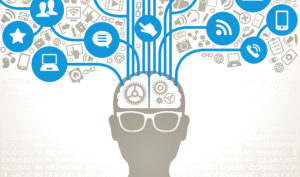
Individuals’ brain activity patterns are unique enough that they’re almost like fingerprints, according to new research from a team at Yale. The findings of their study were published in the Nature Neuroscience journal.
Conducted as part of a bigger research endeavour called the Human Connectome Project, the study looked at the fMRI scans of 126 individuals across six imaging sessions. In four of those sessions, the subjects were asked to perform special cognitive tasks, while in the other two they were instructed simply to rest. By analyzing the data associated with activity in various regions of the brain and how they worked together, researchers found that highly individualized patterns emerged. So much so that, as they put it in their research paper, they were able to “demonstrate that it is possible, with near-perfect accuracy in many cases, to identify an individual from a large group of subjects solely on the basis of his or her connectivity matrix.”
It’s another sign of the potential of brain activity as a means biometric identification and authentication, with other recent research on individuals’ neurological responses to certain words having suggested similar possibilities. Soon, brainwave biometrics could join the ranks of other emerging modalities, such as gait recognition and DNA analysis, as a means of biometric identification with real market potential.
—
October 15, 2015 – by Alex Perala


Follow Us